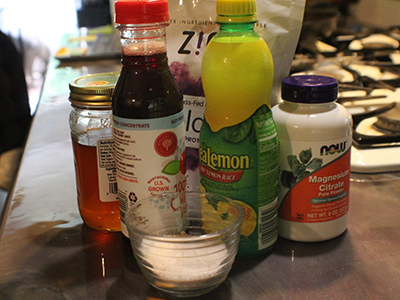
DIY Magnesium Gummies
Would you be surprised to learn that roughly 11% of patients who are hospitalized and 65% of patients who are receiving critical care are magnesium deficient?
It probably wouldn’t surprise you as much if you knew that at least half the population is magnesium deficient. And the reality is that magnesium deficiency can lead to a whole range of health issues, including irregular heartbeats, muscular cramps, and fatigue.
In fact, magnesium’s importance in the human body cannot be overstated. Without magnesium, the body can’t metabolize vitamin D, produce energy, contract and relax muscles, or make many vital hormones.
Also, magnesium and sleep are closely linked; if magnesium levels are too low, sleeping can be difficult.
The truth is that this vital mineral is responsible for more than 300 biochemical reactions in the body, including energy production, muscle function, and nerve transmission.
Magnesium gummies, with their ease of use, are a practical and convenient way to supplement magnesium intake. They are especially beneficial for those who struggle with swallowing pills or prefer a more palatable magnesium supplement.
These homemade magnesium gummies are a great addition to your routine because they help facilitate different biological processes, such as muscular and nerve functions.
Benefits of Magnesium
Magnesium plays a crucial role in maintaining muscle and nerve cell function, keeping blood sugar levels and blood pressure in check, and producing protein and DNA. Likewise, it has the added benefit of promoting muscle relaxation by regulating neurotransmitter release and balancing calcium levels in the body.
Magnesium is also quite impressive when it comes to keeping the nervous system in check. Kind of like a master conductor, making sure nerve signals are flowing smoothly throughout the body. And it’s absolutely essential for maintaining proper nerve and muscle function.
Without this mineral, our body could not properly transmit signals from the brain to the muscles.
In addition to its role in regulating calcium and potassium levels, magnesium also helps with muscle contraction and relaxation.
Magnesium is also needed for calcium absorption, which keeps our bones healthy and strong. Not only does it help increase bone density, but it also lowers the risk of osteoporosis and promotes general bone strength.
And if all that’s not enough, this mineral also contributes to overall well-being by helping with stress management and regulating energy production.
I used tart cherry and lemon to flavor these gummies because their tartness easily masks any unpleasant flavor the magnesium may give off. You don’t need a lot of honey to sweeten them. Also, these two ingredients contribute to the overall health benefits!
I went from barely sleeping at night (like barely getting 2-3 hours of rest), while having anxiety and panic attacks to how I’m feeling right now. I sleep better, I’m always well-rested, go to bed easily, and I barely get joint pains anymore. It also offers a lot of relief from headaches or migraines.
But this time, I didn’t buy the magnesium supplements. I made them myself, but with Dr. Nicole Apelian’s help.
I took her class on herbalism, The Lost Remedies Academy, and she guided me every step of the way.
Lemon and Magnesium
Lemon works well with magnesium because it enhances magnesium’s absorption in the body, making it more effective. Additionally, the citrusy flavor of lemon can help mask the sometimes unpleasant taste of magnesium supplements.
Cherry and Magnesium
Tart cherry and magnesium are a dynamic duo when it comes to soothing muscle discomfort and reducing inflammation. Their powerful antioxidants and anti-inflammatory properties work together to provide relief. Minerals such as magnesium promote sleep and regulate muscle function. When paired with tart cherry, these two create a potent cocktail that can aid muscle repair.
Who Can Benefit from Magnesium Supplements?
Despite magnesium’s importance, most people are lacking in it. According to World Health Organization data, up to 75% of adults in the United States fail to meet the Food and Drug Administration’s recommended daily intake of 420 mg. Signs that you may be low in magnesium include:
- low appetite
- nausea or vomiting
- constipation
- low energy
- muscle, cramps, spasms, or tremors
- Abnormal heart rhythms
Magnesium supplements can also help improve exercise performance and support muscle recovery. They are also often used to help maintain a normal heart rhythm and reduce the risk of atrial fibrillation and cardiac arrhythmia.
But you need to be careful not to use fake supplements. This topic was discussed in this article: Are Your Supplements Fake?
On the other hand, if you’ve had an excessive amount of magnesium, you’re likely to feel the effects. When the body has absorbed enough magnesium, it eliminates it through your stool. So, if you take too much magnesium, it can cause some diarrhea and stomach upset.
Magnesium can also interfere with absorbing other minerals and drugs, such as antibiotics and osteoporosis medications. If you are currently on any prescription medications, you should contact your healthcare professional before taking magnesium supplements to avoid any potential interactions.
⇒ Here’s An Ingenious Way to Stockpile Prescription Medicines (Video)
Homemade Magnesium Gummy Recipe
 Ingredients
Ingredients
- 2 tablespoons of magnesium citrate powder
- 2 tablespoons of natural gelatin
- 2 tablespoons of raw honey
- 2 tablespoons of lemon juice
- ½ cup tart cherry juice
- A pinch of sea salt
Instructions
- Mix the magnesium citrate powder with the gelatin. Pour the cherry and lemon juice into the pot, then sprinkle the gelatin and magnesium mixture over the top. Quickly whisk it in to avoid lumps. (Don’t worry if you get a few chunks. We’ll strain it later.

- Once the gelatin has “bloomed” or set for around five minutes, add the honey and turn the heat to low. Stir on low for approximately five minutes or until the mixture has fully incorporated. Avoid whisking during this step since it produces foam that is difficult to deflate. This produces a white layer on one side of the gummies, though it is not a big issue for me.

- Place it in a pourable jar or container or strain it into your molds or pan. You can also use a wire mesh to remove residual bits or skip this step.

- Place the gelatin in the refrigerator for three to four hours or until fully set. Once hardened, you can remove the magnesium gummies from their molds or cut them into squares if using a baking pan. Keep them in an airtight container in the refrigerator. They should be good for about a week or so. This recipe makes approximately twelve gummies.

Because these homemade magnesium gummies are made from food, the recommended dosage is more flexible than something like over-the-counter medicine. Every serving (2 pieces) contains around 450 mg of magnesium.
Here are some suggested dosages to start with, or you can begin with half the recommended dosage and gradually increase if you tolerate them well. If you want, you can also easily cut the added magnesium in half.
Adults – take two gummies with a meal as needed.
Children – over the age of six take one gummy with food. You may want to keep out of children’s reach since the gummies can be tempting for a child and they won’t stop at just one.
To sum it up, the perks of magnesium are truly remarkable. From helping you get a good night’s sleep and relieving stress to aiding in muscle and nerve recovery. Including these DIY gummies in your health routine is a fantastic way to support important bodily processes while enjoying a burst of antioxidants and delicious flavor!
The remedies that you make from your backyard plants or those you pick directly from nature are much more powerful and you know exactly what went in them. That’s why a class like Dr. Nicole Apelian’s The Lost Remedies Academy could put an end to all of your second guessing.
I invite you to check out the Academy here. The spots are filling up quickly, so there aren’t that many left!

 Ingredients
Ingredients




Why magnesium citrate and not magnesium malate?
M.ag. Citrate is one of the most absorbent forms of chelated magnesium.
The best one for absorption is considered to be Mag. Glycinate.
Also wanted to point out, that M.ag. Citrate is mostly used for gut issues. While Mag. Glycinate promotes relaxation and helps to sleep well.
Do you make them? I would like to purchase them as I have used commercial melotonin and its giving me some problems in my system. I know it is not good for me.
What if you require both?
Hi, Magnesium citrate is not natural. Hence how do you get a natural magnesium compound? Thank you so much.